Ethics & Sustainability: Volkswagen Emission Scandal Business Case
VerifiedAdded on 2023/05/28
|12
|2955
|365
Report
AI Summary
This report examines the Volkswagen emission scandal, focusing on the ethical and sustainability implications of the company's actions. It details how Volkswagen used a "defeat device" to cheat emission tests, impacting various stakeholders including customers, employees, and the environment. The report employs stakeholder theory to analyze the scandal, emphasizing the interconnected relationships between the company and its stakeholders. Alternative solutions for Volkswagen are identified, such as stakeholder engagement, rebranding, and shifting focus to gasoline models. The report recommends that Volkswagen prioritize rebuilding trust through ethical practices and sustainable strategies. Desklib offers a platform where students can access this report and many other solved assignments.
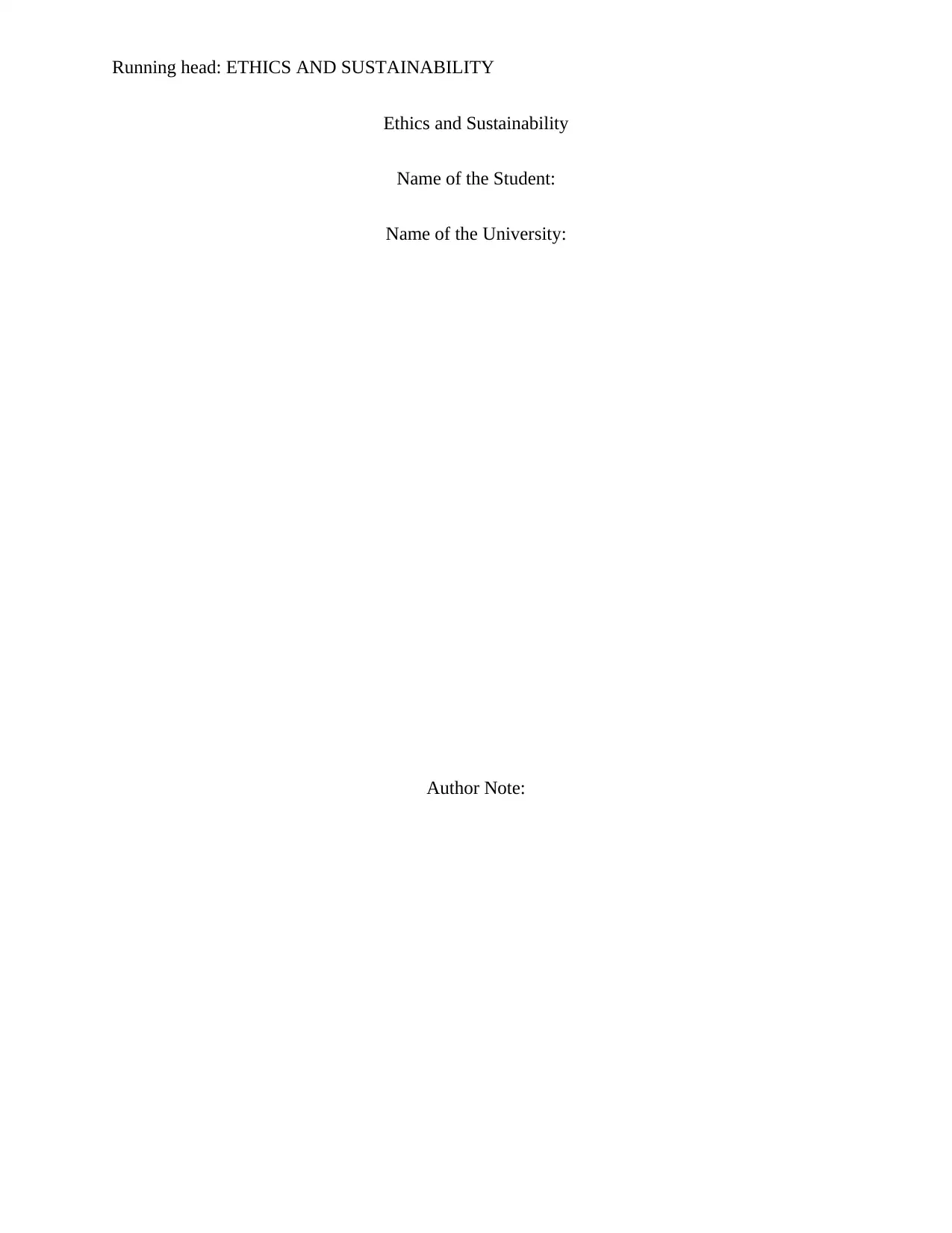
Running head: ETHICS AND SUSTAINABILITY
Ethics and Sustainability
Name of the Student:
Name of the University:
Author Note:
Ethics and Sustainability
Name of the Student:
Name of the University:
Author Note:
Paraphrase This Document
Need a fresh take? Get an instant paraphrase of this document with our AI Paraphraser
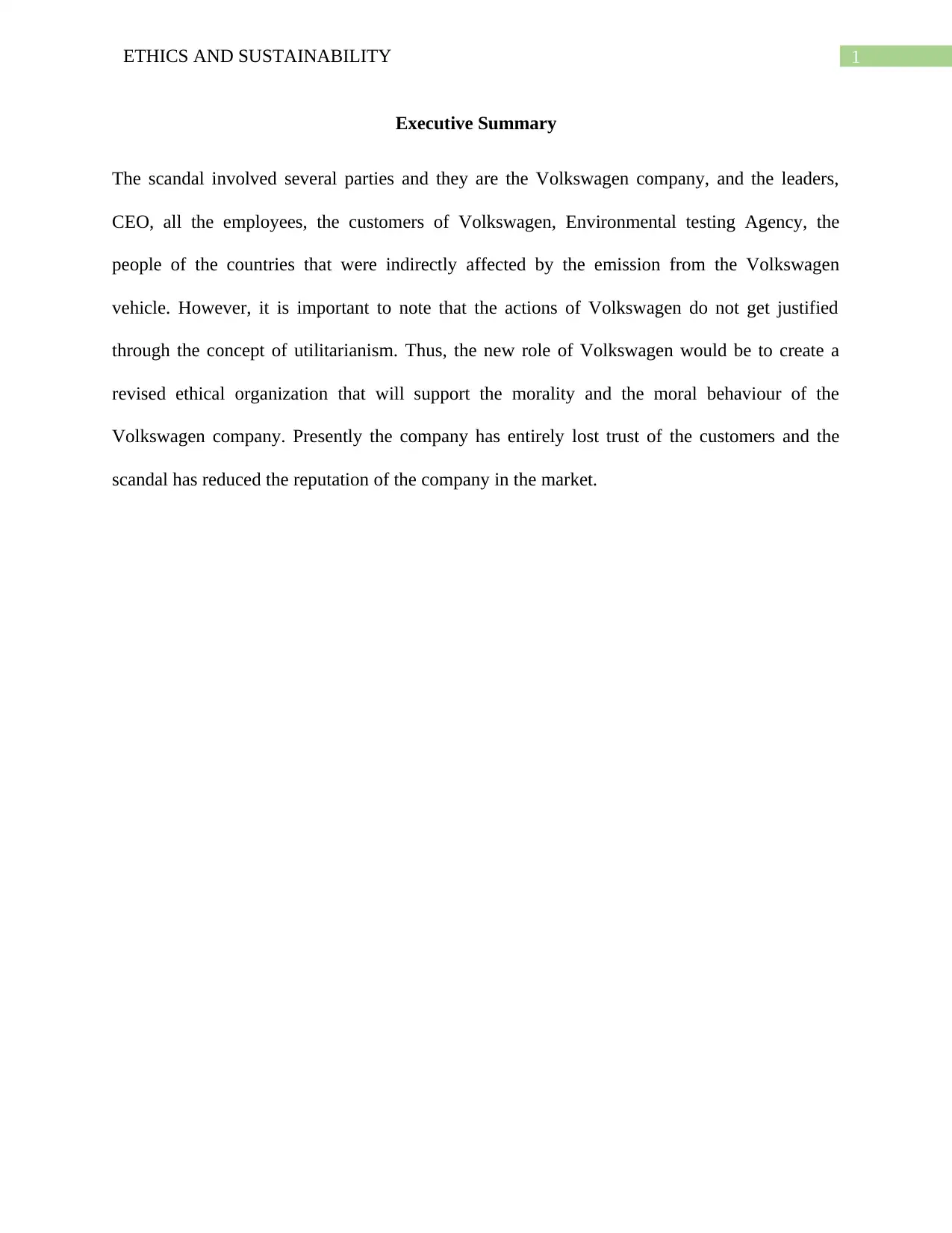
1ETHICS AND SUSTAINABILITY
Executive Summary
The scandal involved several parties and they are the Volkswagen company, and the leaders,
CEO, all the employees, the customers of Volkswagen, Environmental testing Agency, the
people of the countries that were indirectly affected by the emission from the Volkswagen
vehicle. However, it is important to note that the actions of Volkswagen do not get justified
through the concept of utilitarianism. Thus, the new role of Volkswagen would be to create a
revised ethical organization that will support the morality and the moral behaviour of the
Volkswagen company. Presently the company has entirely lost trust of the customers and the
scandal has reduced the reputation of the company in the market.
Executive Summary
The scandal involved several parties and they are the Volkswagen company, and the leaders,
CEO, all the employees, the customers of Volkswagen, Environmental testing Agency, the
people of the countries that were indirectly affected by the emission from the Volkswagen
vehicle. However, it is important to note that the actions of Volkswagen do not get justified
through the concept of utilitarianism. Thus, the new role of Volkswagen would be to create a
revised ethical organization that will support the morality and the moral behaviour of the
Volkswagen company. Presently the company has entirely lost trust of the customers and the
scandal has reduced the reputation of the company in the market.
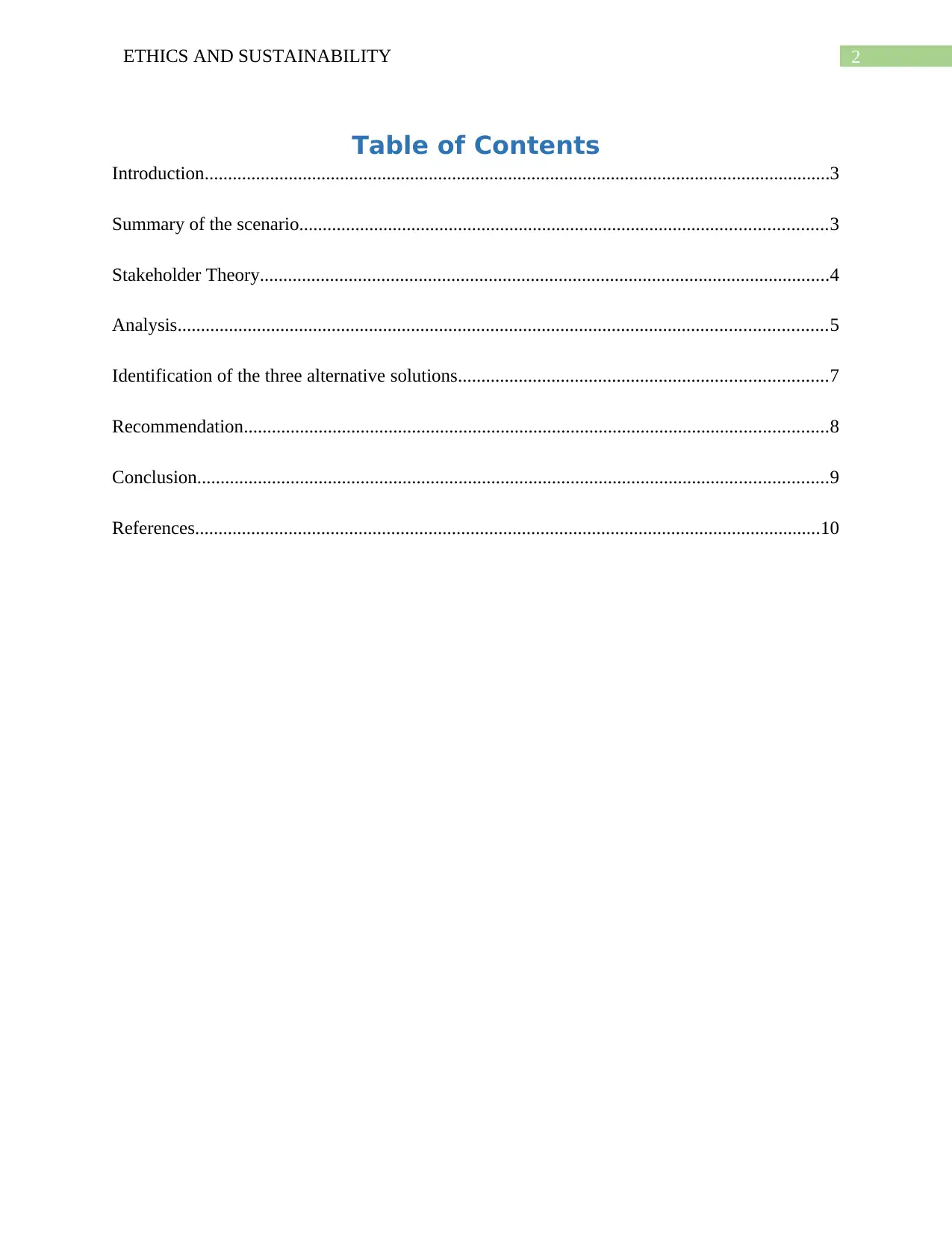
2ETHICS AND SUSTAINABILITY
Table of Contents
Introduction......................................................................................................................................3
Summary of the scenario.................................................................................................................3
Stakeholder Theory..........................................................................................................................4
Analysis...........................................................................................................................................5
Identification of the three alternative solutions...............................................................................7
Recommendation.............................................................................................................................8
Conclusion.......................................................................................................................................9
References......................................................................................................................................10
Table of Contents
Introduction......................................................................................................................................3
Summary of the scenario.................................................................................................................3
Stakeholder Theory..........................................................................................................................4
Analysis...........................................................................................................................................5
Identification of the three alternative solutions...............................................................................7
Recommendation.............................................................................................................................8
Conclusion.......................................................................................................................................9
References......................................................................................................................................10
⊘ This is a preview!⊘
Do you want full access?
Subscribe today to unlock all pages.

Trusted by 1+ million students worldwide
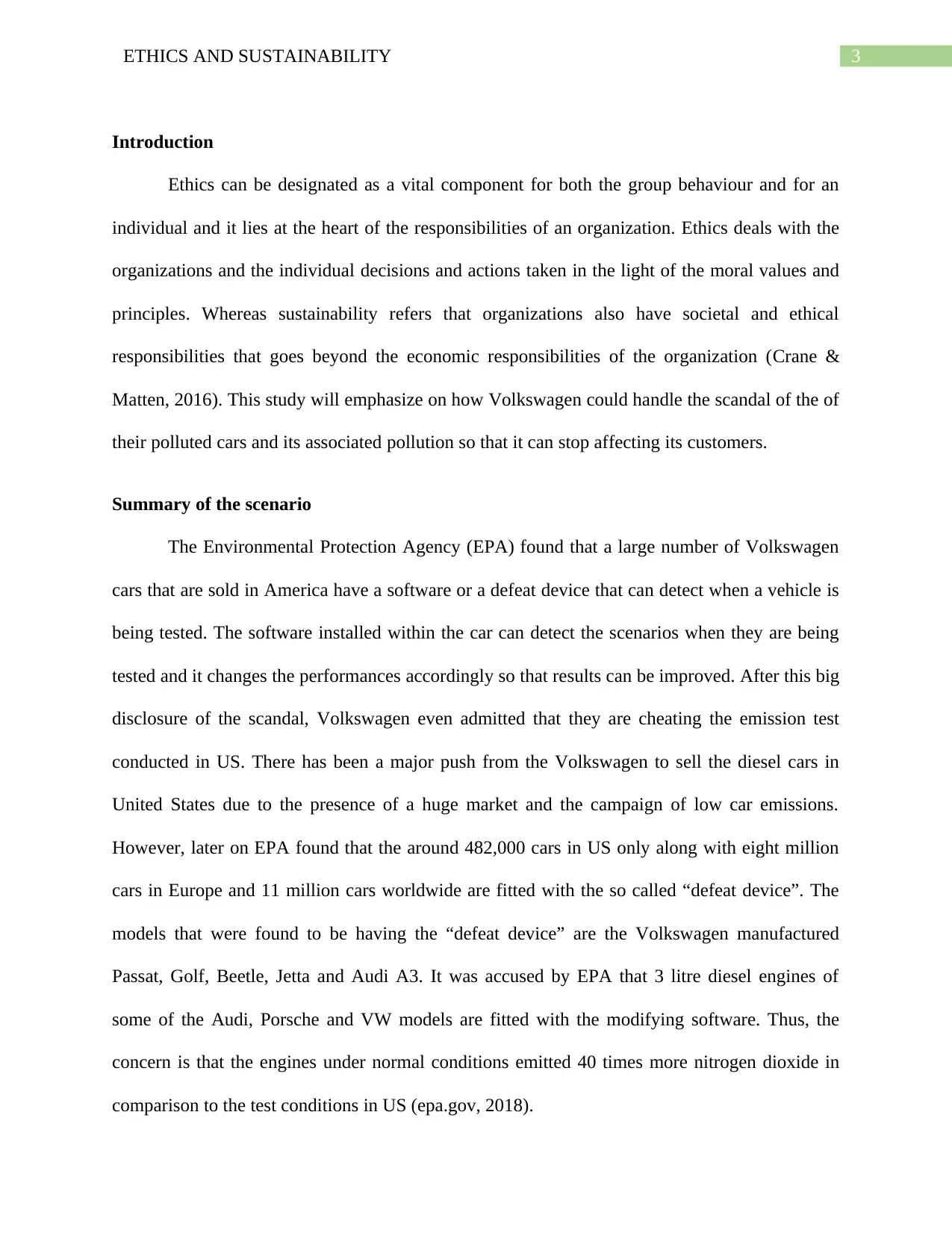
3ETHICS AND SUSTAINABILITY
Introduction
Ethics can be designated as a vital component for both the group behaviour and for an
individual and it lies at the heart of the responsibilities of an organization. Ethics deals with the
organizations and the individual decisions and actions taken in the light of the moral values and
principles. Whereas sustainability refers that organizations also have societal and ethical
responsibilities that goes beyond the economic responsibilities of the organization (Crane &
Matten, 2016). This study will emphasize on how Volkswagen could handle the scandal of the of
their polluted cars and its associated pollution so that it can stop affecting its customers.
Summary of the scenario
The Environmental Protection Agency (EPA) found that a large number of Volkswagen
cars that are sold in America have a software or a defeat device that can detect when a vehicle is
being tested. The software installed within the car can detect the scenarios when they are being
tested and it changes the performances accordingly so that results can be improved. After this big
disclosure of the scandal, Volkswagen even admitted that they are cheating the emission test
conducted in US. There has been a major push from the Volkswagen to sell the diesel cars in
United States due to the presence of a huge market and the campaign of low car emissions.
However, later on EPA found that the around 482,000 cars in US only along with eight million
cars in Europe and 11 million cars worldwide are fitted with the so called “defeat device”. The
models that were found to be having the “defeat device” are the Volkswagen manufactured
Passat, Golf, Beetle, Jetta and Audi A3. It was accused by EPA that 3 litre diesel engines of
some of the Audi, Porsche and VW models are fitted with the modifying software. Thus, the
concern is that the engines under normal conditions emitted 40 times more nitrogen dioxide in
comparison to the test conditions in US (epa.gov, 2018).
Introduction
Ethics can be designated as a vital component for both the group behaviour and for an
individual and it lies at the heart of the responsibilities of an organization. Ethics deals with the
organizations and the individual decisions and actions taken in the light of the moral values and
principles. Whereas sustainability refers that organizations also have societal and ethical
responsibilities that goes beyond the economic responsibilities of the organization (Crane &
Matten, 2016). This study will emphasize on how Volkswagen could handle the scandal of the of
their polluted cars and its associated pollution so that it can stop affecting its customers.
Summary of the scenario
The Environmental Protection Agency (EPA) found that a large number of Volkswagen
cars that are sold in America have a software or a defeat device that can detect when a vehicle is
being tested. The software installed within the car can detect the scenarios when they are being
tested and it changes the performances accordingly so that results can be improved. After this big
disclosure of the scandal, Volkswagen even admitted that they are cheating the emission test
conducted in US. There has been a major push from the Volkswagen to sell the diesel cars in
United States due to the presence of a huge market and the campaign of low car emissions.
However, later on EPA found that the around 482,000 cars in US only along with eight million
cars in Europe and 11 million cars worldwide are fitted with the so called “defeat device”. The
models that were found to be having the “defeat device” are the Volkswagen manufactured
Passat, Golf, Beetle, Jetta and Audi A3. It was accused by EPA that 3 litre diesel engines of
some of the Audi, Porsche and VW models are fitted with the modifying software. Thus, the
concern is that the engines under normal conditions emitted 40 times more nitrogen dioxide in
comparison to the test conditions in US (epa.gov, 2018).
Paraphrase This Document
Need a fresh take? Get an instant paraphrase of this document with our AI Paraphraser
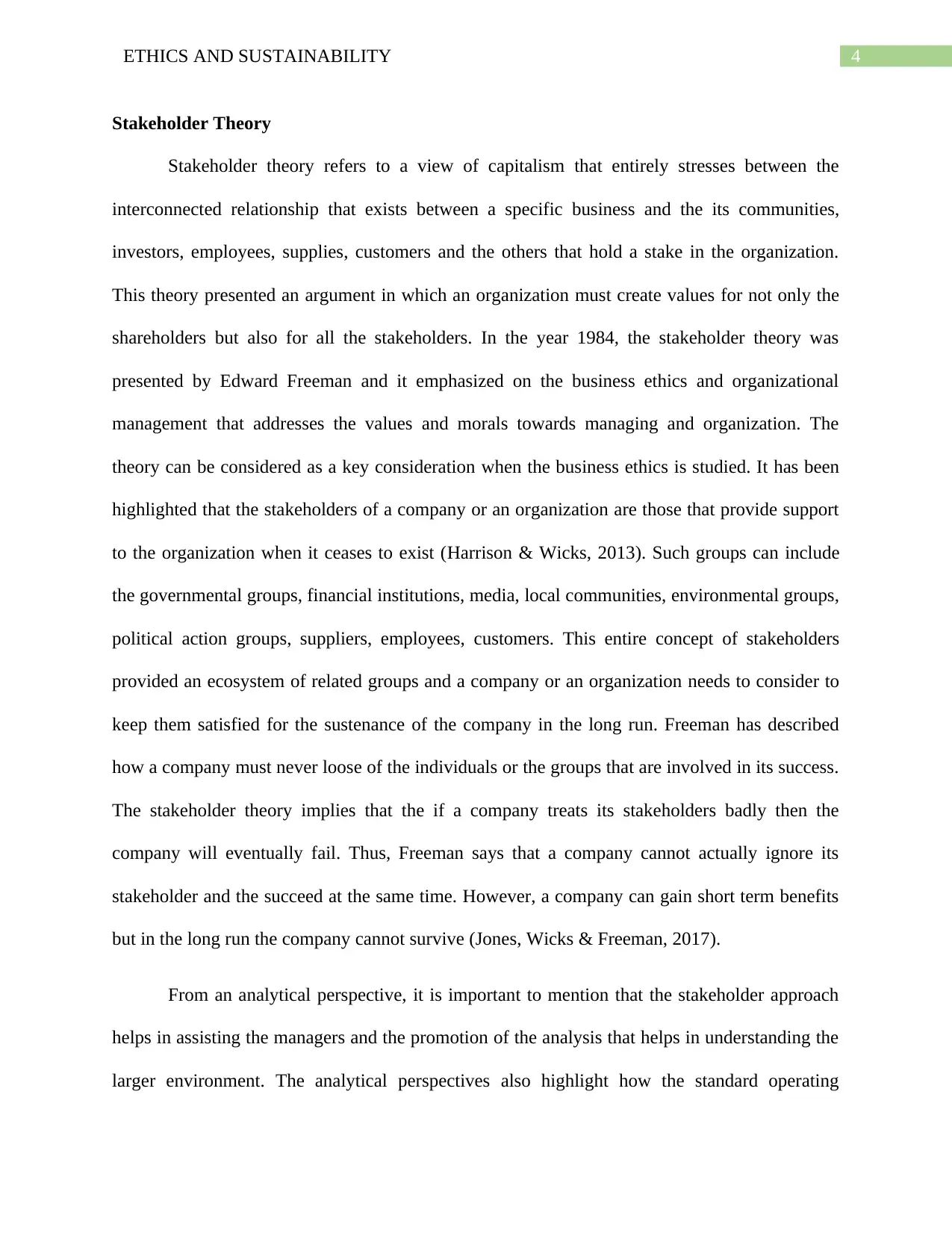
4ETHICS AND SUSTAINABILITY
Stakeholder Theory
Stakeholder theory refers to a view of capitalism that entirely stresses between the
interconnected relationship that exists between a specific business and the its communities,
investors, employees, supplies, customers and the others that hold a stake in the organization.
This theory presented an argument in which an organization must create values for not only the
shareholders but also for all the stakeholders. In the year 1984, the stakeholder theory was
presented by Edward Freeman and it emphasized on the business ethics and organizational
management that addresses the values and morals towards managing and organization. The
theory can be considered as a key consideration when the business ethics is studied. It has been
highlighted that the stakeholders of a company or an organization are those that provide support
to the organization when it ceases to exist (Harrison & Wicks, 2013). Such groups can include
the governmental groups, financial institutions, media, local communities, environmental groups,
political action groups, suppliers, employees, customers. This entire concept of stakeholders
provided an ecosystem of related groups and a company or an organization needs to consider to
keep them satisfied for the sustenance of the company in the long run. Freeman has described
how a company must never loose of the individuals or the groups that are involved in its success.
The stakeholder theory implies that the if a company treats its stakeholders badly then the
company will eventually fail. Thus, Freeman says that a company cannot actually ignore its
stakeholder and the succeed at the same time. However, a company can gain short term benefits
but in the long run the company cannot survive (Jones, Wicks & Freeman, 2017).
From an analytical perspective, it is important to mention that the stakeholder approach
helps in assisting the managers and the promotion of the analysis that helps in understanding the
larger environment. The analytical perspectives also highlight how the standard operating
Stakeholder Theory
Stakeholder theory refers to a view of capitalism that entirely stresses between the
interconnected relationship that exists between a specific business and the its communities,
investors, employees, supplies, customers and the others that hold a stake in the organization.
This theory presented an argument in which an organization must create values for not only the
shareholders but also for all the stakeholders. In the year 1984, the stakeholder theory was
presented by Edward Freeman and it emphasized on the business ethics and organizational
management that addresses the values and morals towards managing and organization. The
theory can be considered as a key consideration when the business ethics is studied. It has been
highlighted that the stakeholders of a company or an organization are those that provide support
to the organization when it ceases to exist (Harrison & Wicks, 2013). Such groups can include
the governmental groups, financial institutions, media, local communities, environmental groups,
political action groups, suppliers, employees, customers. This entire concept of stakeholders
provided an ecosystem of related groups and a company or an organization needs to consider to
keep them satisfied for the sustenance of the company in the long run. Freeman has described
how a company must never loose of the individuals or the groups that are involved in its success.
The stakeholder theory implies that the if a company treats its stakeholders badly then the
company will eventually fail. Thus, Freeman says that a company cannot actually ignore its
stakeholder and the succeed at the same time. However, a company can gain short term benefits
but in the long run the company cannot survive (Jones, Wicks & Freeman, 2017).
From an analytical perspective, it is important to mention that the stakeholder approach
helps in assisting the managers and the promotion of the analysis that helps in understanding the
larger environment. The analytical perspectives also highlight how the standard operating
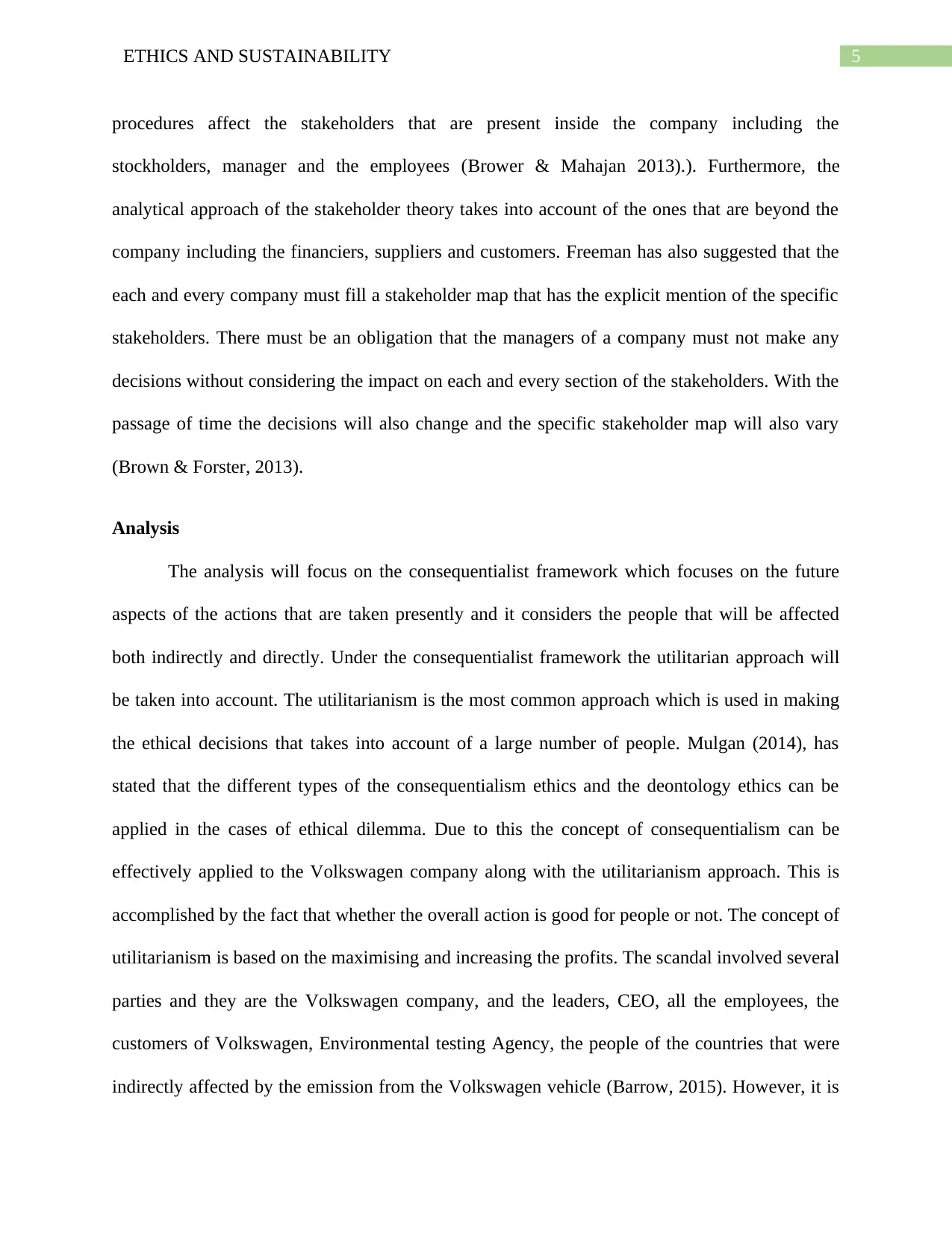
5ETHICS AND SUSTAINABILITY
procedures affect the stakeholders that are present inside the company including the
stockholders, manager and the employees (Brower & Mahajan 2013).). Furthermore, the
analytical approach of the stakeholder theory takes into account of the ones that are beyond the
company including the financiers, suppliers and customers. Freeman has also suggested that the
each and every company must fill a stakeholder map that has the explicit mention of the specific
stakeholders. There must be an obligation that the managers of a company must not make any
decisions without considering the impact on each and every section of the stakeholders. With the
passage of time the decisions will also change and the specific stakeholder map will also vary
(Brown & Forster, 2013).
Analysis
The analysis will focus on the consequentialist framework which focuses on the future
aspects of the actions that are taken presently and it considers the people that will be affected
both indirectly and directly. Under the consequentialist framework the utilitarian approach will
be taken into account. The utilitarianism is the most common approach which is used in making
the ethical decisions that takes into account of a large number of people. Mulgan (2014), has
stated that the different types of the consequentialism ethics and the deontology ethics can be
applied in the cases of ethical dilemma. Due to this the concept of consequentialism can be
effectively applied to the Volkswagen company along with the utilitarianism approach. This is
accomplished by the fact that whether the overall action is good for people or not. The concept of
utilitarianism is based on the maximising and increasing the profits. The scandal involved several
parties and they are the Volkswagen company, and the leaders, CEO, all the employees, the
customers of Volkswagen, Environmental testing Agency, the people of the countries that were
indirectly affected by the emission from the Volkswagen vehicle (Barrow, 2015). However, it is
procedures affect the stakeholders that are present inside the company including the
stockholders, manager and the employees (Brower & Mahajan 2013).). Furthermore, the
analytical approach of the stakeholder theory takes into account of the ones that are beyond the
company including the financiers, suppliers and customers. Freeman has also suggested that the
each and every company must fill a stakeholder map that has the explicit mention of the specific
stakeholders. There must be an obligation that the managers of a company must not make any
decisions without considering the impact on each and every section of the stakeholders. With the
passage of time the decisions will also change and the specific stakeholder map will also vary
(Brown & Forster, 2013).
Analysis
The analysis will focus on the consequentialist framework which focuses on the future
aspects of the actions that are taken presently and it considers the people that will be affected
both indirectly and directly. Under the consequentialist framework the utilitarian approach will
be taken into account. The utilitarianism is the most common approach which is used in making
the ethical decisions that takes into account of a large number of people. Mulgan (2014), has
stated that the different types of the consequentialism ethics and the deontology ethics can be
applied in the cases of ethical dilemma. Due to this the concept of consequentialism can be
effectively applied to the Volkswagen company along with the utilitarianism approach. This is
accomplished by the fact that whether the overall action is good for people or not. The concept of
utilitarianism is based on the maximising and increasing the profits. The scandal involved several
parties and they are the Volkswagen company, and the leaders, CEO, all the employees, the
customers of Volkswagen, Environmental testing Agency, the people of the countries that were
indirectly affected by the emission from the Volkswagen vehicle (Barrow, 2015). However, it is
⊘ This is a preview!⊘
Do you want full access?
Subscribe today to unlock all pages.

Trusted by 1+ million students worldwide
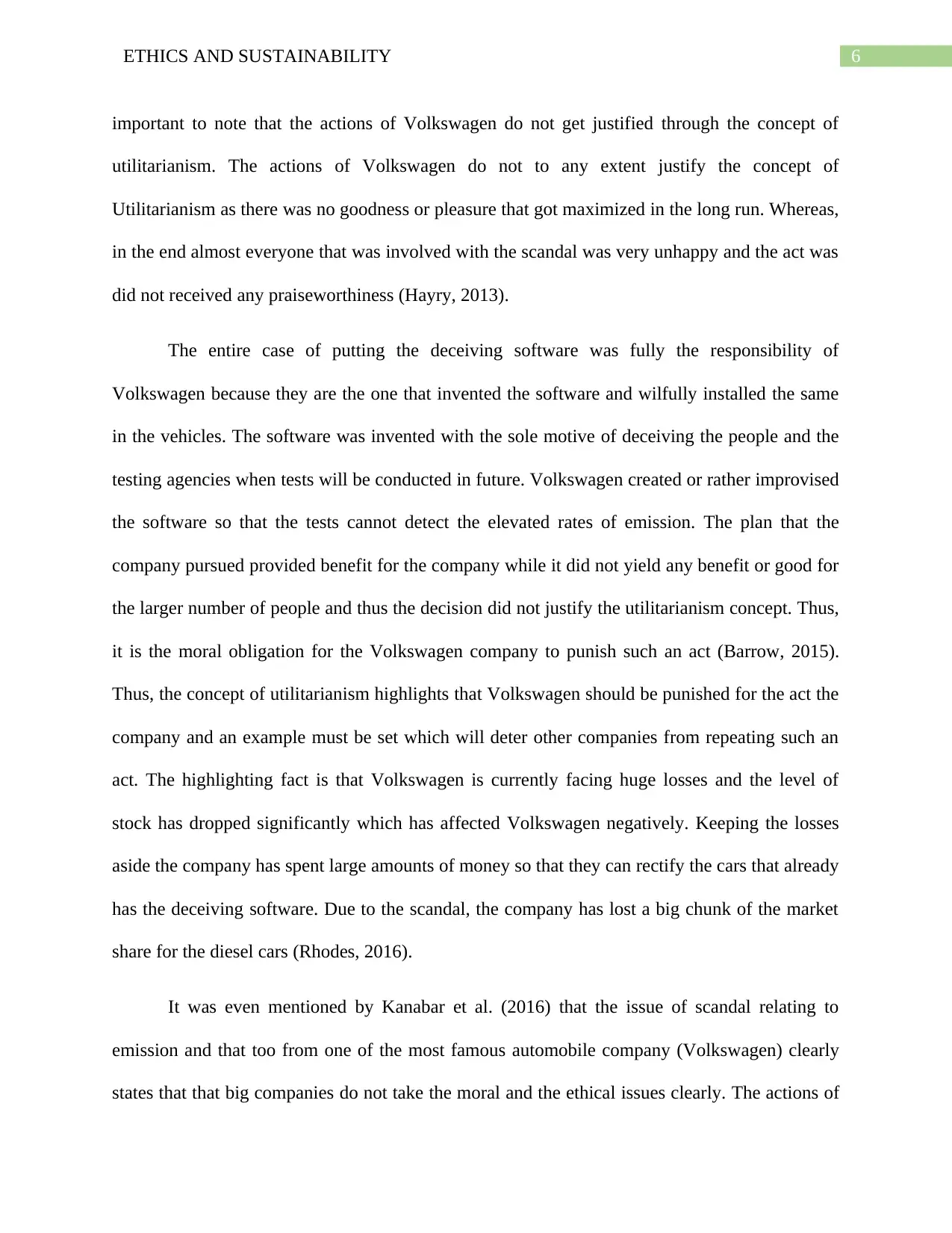
6ETHICS AND SUSTAINABILITY
important to note that the actions of Volkswagen do not get justified through the concept of
utilitarianism. The actions of Volkswagen do not to any extent justify the concept of
Utilitarianism as there was no goodness or pleasure that got maximized in the long run. Whereas,
in the end almost everyone that was involved with the scandal was very unhappy and the act was
did not received any praiseworthiness (Hayry, 2013).
The entire case of putting the deceiving software was fully the responsibility of
Volkswagen because they are the one that invented the software and wilfully installed the same
in the vehicles. The software was invented with the sole motive of deceiving the people and the
testing agencies when tests will be conducted in future. Volkswagen created or rather improvised
the software so that the tests cannot detect the elevated rates of emission. The plan that the
company pursued provided benefit for the company while it did not yield any benefit or good for
the larger number of people and thus the decision did not justify the utilitarianism concept. Thus,
it is the moral obligation for the Volkswagen company to punish such an act (Barrow, 2015).
Thus, the concept of utilitarianism highlights that Volkswagen should be punished for the act the
company and an example must be set which will deter other companies from repeating such an
act. The highlighting fact is that Volkswagen is currently facing huge losses and the level of
stock has dropped significantly which has affected Volkswagen negatively. Keeping the losses
aside the company has spent large amounts of money so that they can rectify the cars that already
has the deceiving software. Due to the scandal, the company has lost a big chunk of the market
share for the diesel cars (Rhodes, 2016).
It was even mentioned by Kanabar et al. (2016) that the issue of scandal relating to
emission and that too from one of the most famous automobile company (Volkswagen) clearly
states that that big companies do not take the moral and the ethical issues clearly. The actions of
important to note that the actions of Volkswagen do not get justified through the concept of
utilitarianism. The actions of Volkswagen do not to any extent justify the concept of
Utilitarianism as there was no goodness or pleasure that got maximized in the long run. Whereas,
in the end almost everyone that was involved with the scandal was very unhappy and the act was
did not received any praiseworthiness (Hayry, 2013).
The entire case of putting the deceiving software was fully the responsibility of
Volkswagen because they are the one that invented the software and wilfully installed the same
in the vehicles. The software was invented with the sole motive of deceiving the people and the
testing agencies when tests will be conducted in future. Volkswagen created or rather improvised
the software so that the tests cannot detect the elevated rates of emission. The plan that the
company pursued provided benefit for the company while it did not yield any benefit or good for
the larger number of people and thus the decision did not justify the utilitarianism concept. Thus,
it is the moral obligation for the Volkswagen company to punish such an act (Barrow, 2015).
Thus, the concept of utilitarianism highlights that Volkswagen should be punished for the act the
company and an example must be set which will deter other companies from repeating such an
act. The highlighting fact is that Volkswagen is currently facing huge losses and the level of
stock has dropped significantly which has affected Volkswagen negatively. Keeping the losses
aside the company has spent large amounts of money so that they can rectify the cars that already
has the deceiving software. Due to the scandal, the company has lost a big chunk of the market
share for the diesel cars (Rhodes, 2016).
It was even mentioned by Kanabar et al. (2016) that the issue of scandal relating to
emission and that too from one of the most famous automobile company (Volkswagen) clearly
states that that big companies do not take the moral and the ethical issues clearly. The actions of
Paraphrase This Document
Need a fresh take? Get an instant paraphrase of this document with our AI Paraphraser
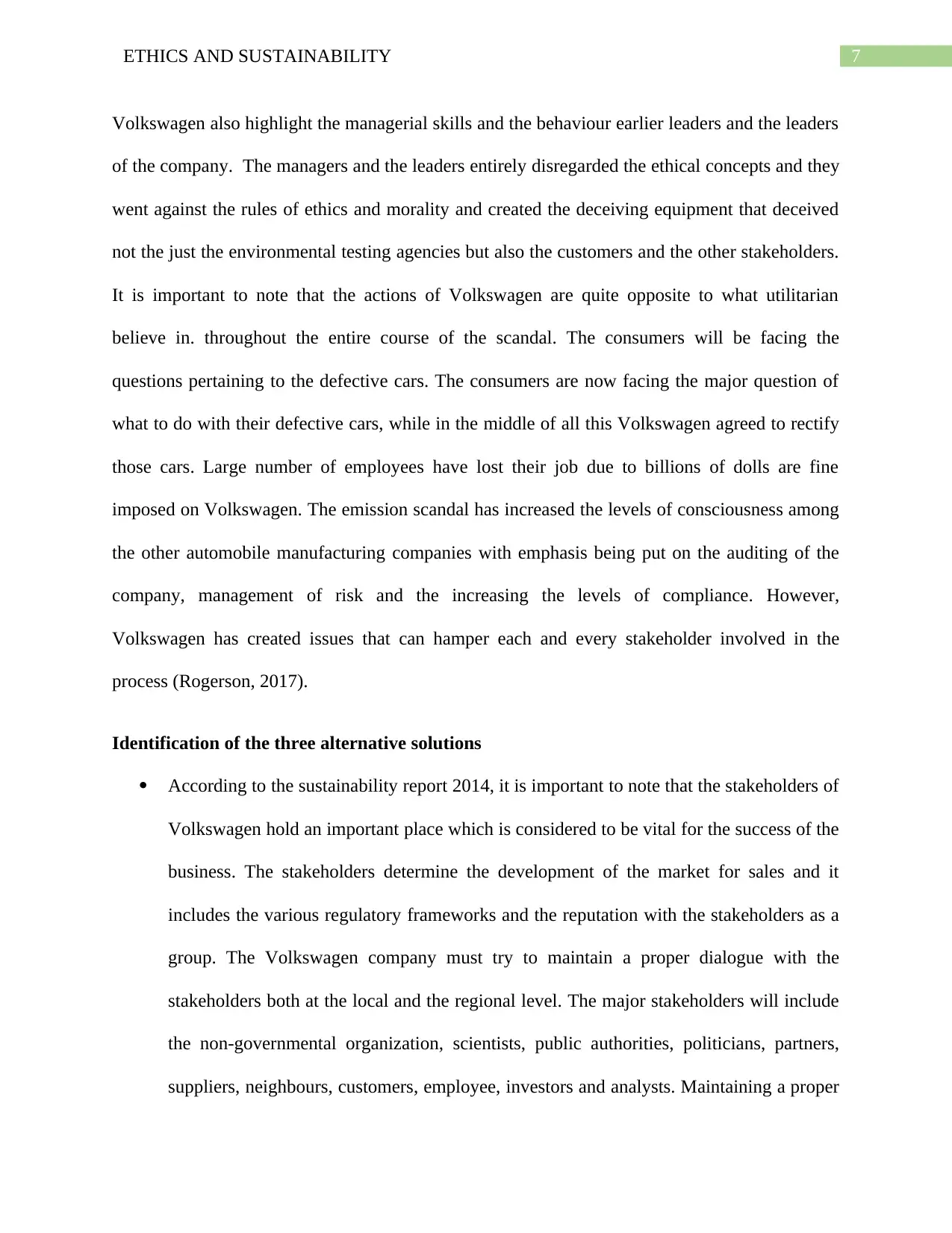
7ETHICS AND SUSTAINABILITY
Volkswagen also highlight the managerial skills and the behaviour earlier leaders and the leaders
of the company. The managers and the leaders entirely disregarded the ethical concepts and they
went against the rules of ethics and morality and created the deceiving equipment that deceived
not the just the environmental testing agencies but also the customers and the other stakeholders.
It is important to note that the actions of Volkswagen are quite opposite to what utilitarian
believe in. throughout the entire course of the scandal. The consumers will be facing the
questions pertaining to the defective cars. The consumers are now facing the major question of
what to do with their defective cars, while in the middle of all this Volkswagen agreed to rectify
those cars. Large number of employees have lost their job due to billions of dolls are fine
imposed on Volkswagen. The emission scandal has increased the levels of consciousness among
the other automobile manufacturing companies with emphasis being put on the auditing of the
company, management of risk and the increasing the levels of compliance. However,
Volkswagen has created issues that can hamper each and every stakeholder involved in the
process (Rogerson, 2017).
Identification of the three alternative solutions
According to the sustainability report 2014, it is important to note that the stakeholders of
Volkswagen hold an important place which is considered to be vital for the success of the
business. The stakeholders determine the development of the market for sales and it
includes the various regulatory frameworks and the reputation with the stakeholders as a
group. The Volkswagen company must try to maintain a proper dialogue with the
stakeholders both at the local and the regional level. The major stakeholders will include
the non-governmental organization, scientists, public authorities, politicians, partners,
suppliers, neighbours, customers, employee, investors and analysts. Maintaining a proper
Volkswagen also highlight the managerial skills and the behaviour earlier leaders and the leaders
of the company. The managers and the leaders entirely disregarded the ethical concepts and they
went against the rules of ethics and morality and created the deceiving equipment that deceived
not the just the environmental testing agencies but also the customers and the other stakeholders.
It is important to note that the actions of Volkswagen are quite opposite to what utilitarian
believe in. throughout the entire course of the scandal. The consumers will be facing the
questions pertaining to the defective cars. The consumers are now facing the major question of
what to do with their defective cars, while in the middle of all this Volkswagen agreed to rectify
those cars. Large number of employees have lost their job due to billions of dolls are fine
imposed on Volkswagen. The emission scandal has increased the levels of consciousness among
the other automobile manufacturing companies with emphasis being put on the auditing of the
company, management of risk and the increasing the levels of compliance. However,
Volkswagen has created issues that can hamper each and every stakeholder involved in the
process (Rogerson, 2017).
Identification of the three alternative solutions
According to the sustainability report 2014, it is important to note that the stakeholders of
Volkswagen hold an important place which is considered to be vital for the success of the
business. The stakeholders determine the development of the market for sales and it
includes the various regulatory frameworks and the reputation with the stakeholders as a
group. The Volkswagen company must try to maintain a proper dialogue with the
stakeholders both at the local and the regional level. The major stakeholders will include
the non-governmental organization, scientists, public authorities, politicians, partners,
suppliers, neighbours, customers, employee, investors and analysts. Maintaining a proper
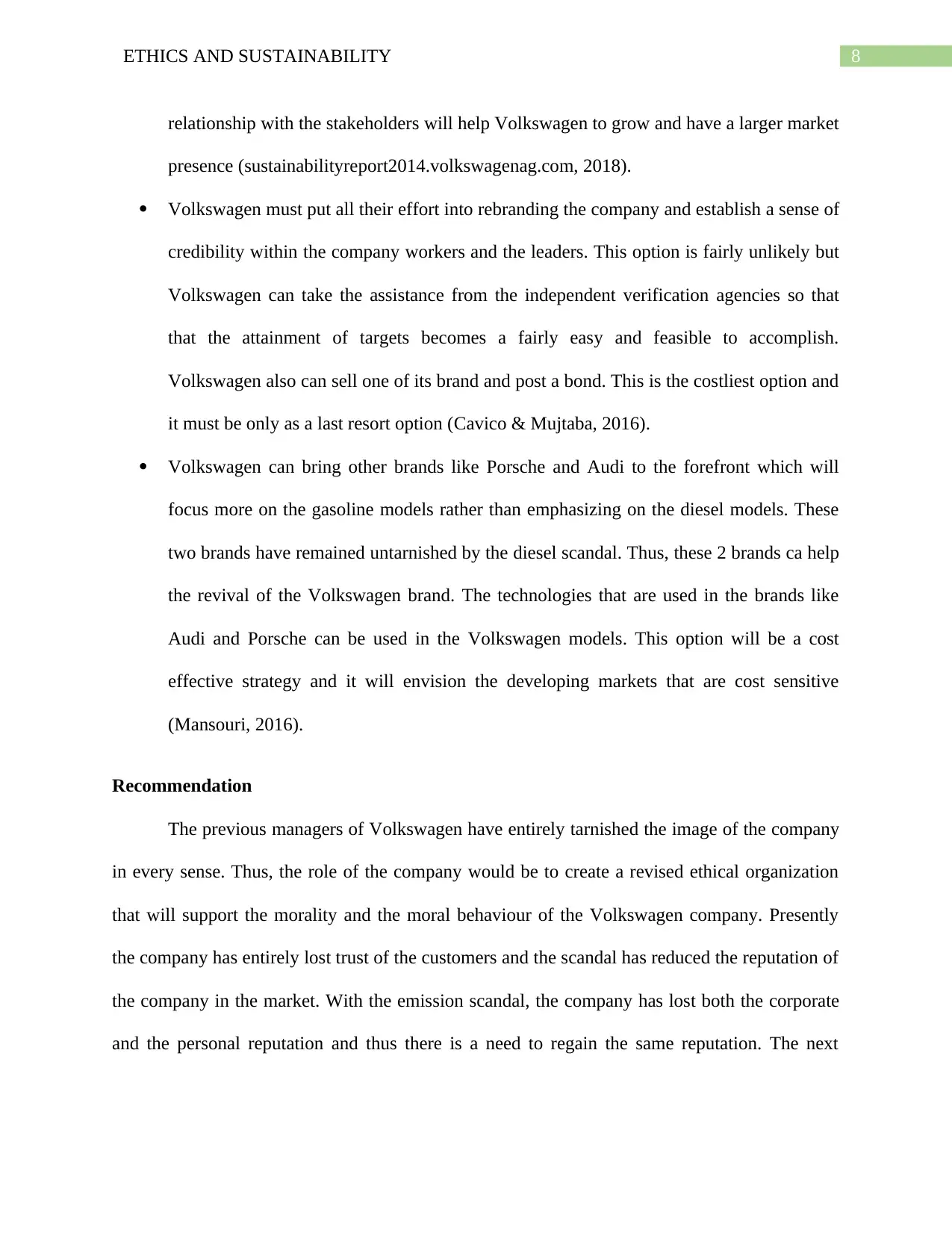
8ETHICS AND SUSTAINABILITY
relationship with the stakeholders will help Volkswagen to grow and have a larger market
presence (sustainabilityreport2014.volkswagenag.com, 2018).
Volkswagen must put all their effort into rebranding the company and establish a sense of
credibility within the company workers and the leaders. This option is fairly unlikely but
Volkswagen can take the assistance from the independent verification agencies so that
that the attainment of targets becomes a fairly easy and feasible to accomplish.
Volkswagen also can sell one of its brand and post a bond. This is the costliest option and
it must be only as a last resort option (Cavico & Mujtaba, 2016).
Volkswagen can bring other brands like Porsche and Audi to the forefront which will
focus more on the gasoline models rather than emphasizing on the diesel models. These
two brands have remained untarnished by the diesel scandal. Thus, these 2 brands ca help
the revival of the Volkswagen brand. The technologies that are used in the brands like
Audi and Porsche can be used in the Volkswagen models. This option will be a cost
effective strategy and it will envision the developing markets that are cost sensitive
(Mansouri, 2016).
Recommendation
The previous managers of Volkswagen have entirely tarnished the image of the company
in every sense. Thus, the role of the company would be to create a revised ethical organization
that will support the morality and the moral behaviour of the Volkswagen company. Presently
the company has entirely lost trust of the customers and the scandal has reduced the reputation of
the company in the market. With the emission scandal, the company has lost both the corporate
and the personal reputation and thus there is a need to regain the same reputation. The next
relationship with the stakeholders will help Volkswagen to grow and have a larger market
presence (sustainabilityreport2014.volkswagenag.com, 2018).
Volkswagen must put all their effort into rebranding the company and establish a sense of
credibility within the company workers and the leaders. This option is fairly unlikely but
Volkswagen can take the assistance from the independent verification agencies so that
that the attainment of targets becomes a fairly easy and feasible to accomplish.
Volkswagen also can sell one of its brand and post a bond. This is the costliest option and
it must be only as a last resort option (Cavico & Mujtaba, 2016).
Volkswagen can bring other brands like Porsche and Audi to the forefront which will
focus more on the gasoline models rather than emphasizing on the diesel models. These
two brands have remained untarnished by the diesel scandal. Thus, these 2 brands ca help
the revival of the Volkswagen brand. The technologies that are used in the brands like
Audi and Porsche can be used in the Volkswagen models. This option will be a cost
effective strategy and it will envision the developing markets that are cost sensitive
(Mansouri, 2016).
Recommendation
The previous managers of Volkswagen have entirely tarnished the image of the company
in every sense. Thus, the role of the company would be to create a revised ethical organization
that will support the morality and the moral behaviour of the Volkswagen company. Presently
the company has entirely lost trust of the customers and the scandal has reduced the reputation of
the company in the market. With the emission scandal, the company has lost both the corporate
and the personal reputation and thus there is a need to regain the same reputation. The next
⊘ This is a preview!⊘
Do you want full access?
Subscribe today to unlock all pages.

Trusted by 1+ million students worldwide
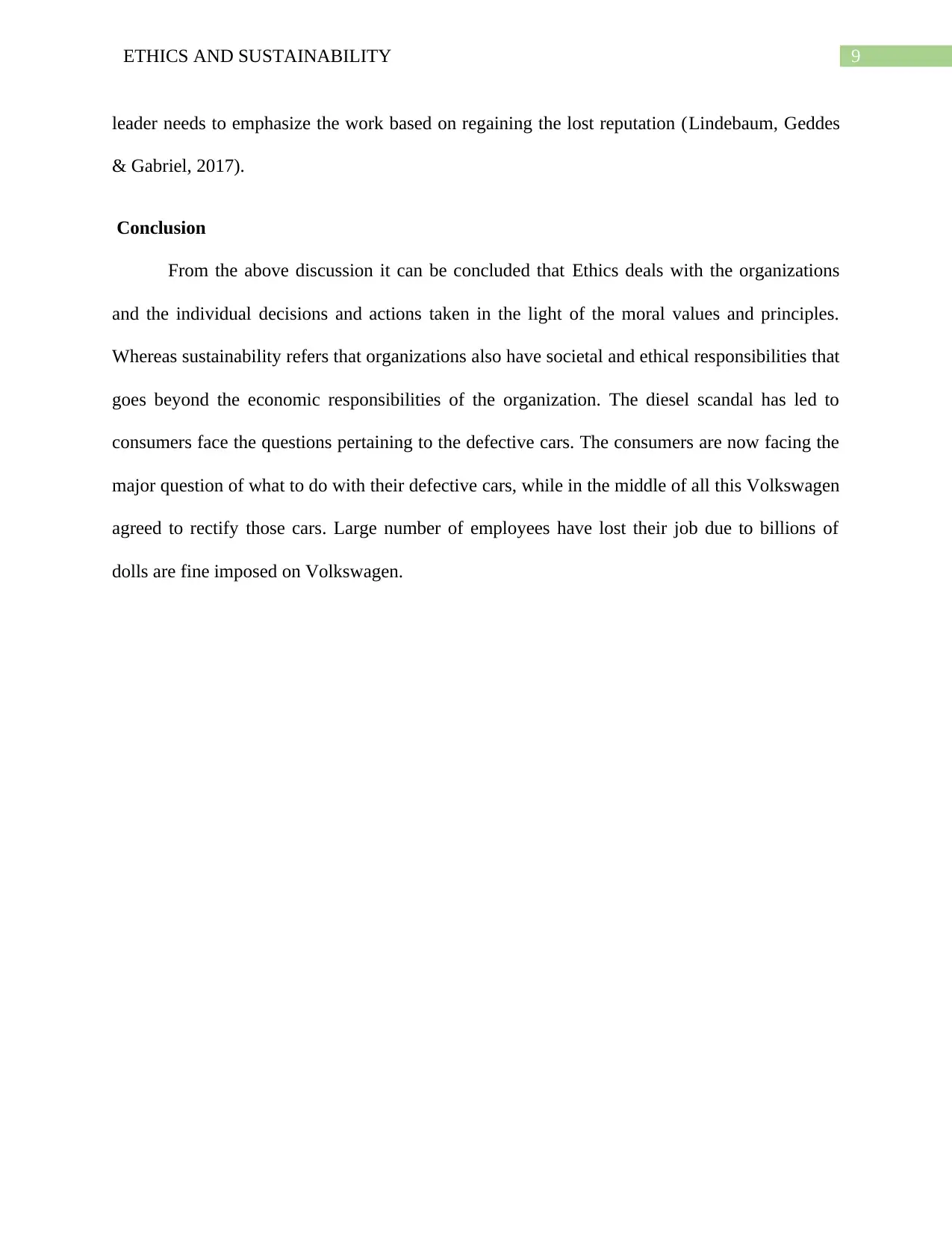
9ETHICS AND SUSTAINABILITY
leader needs to emphasize the work based on regaining the lost reputation (Lindebaum, Geddes
& Gabriel, 2017).
Conclusion
From the above discussion it can be concluded that Ethics deals with the organizations
and the individual decisions and actions taken in the light of the moral values and principles.
Whereas sustainability refers that organizations also have societal and ethical responsibilities that
goes beyond the economic responsibilities of the organization. The diesel scandal has led to
consumers face the questions pertaining to the defective cars. The consumers are now facing the
major question of what to do with their defective cars, while in the middle of all this Volkswagen
agreed to rectify those cars. Large number of employees have lost their job due to billions of
dolls are fine imposed on Volkswagen.
leader needs to emphasize the work based on regaining the lost reputation (Lindebaum, Geddes
& Gabriel, 2017).
Conclusion
From the above discussion it can be concluded that Ethics deals with the organizations
and the individual decisions and actions taken in the light of the moral values and principles.
Whereas sustainability refers that organizations also have societal and ethical responsibilities that
goes beyond the economic responsibilities of the organization. The diesel scandal has led to
consumers face the questions pertaining to the defective cars. The consumers are now facing the
major question of what to do with their defective cars, while in the middle of all this Volkswagen
agreed to rectify those cars. Large number of employees have lost their job due to billions of
dolls are fine imposed on Volkswagen.
Paraphrase This Document
Need a fresh take? Get an instant paraphrase of this document with our AI Paraphraser
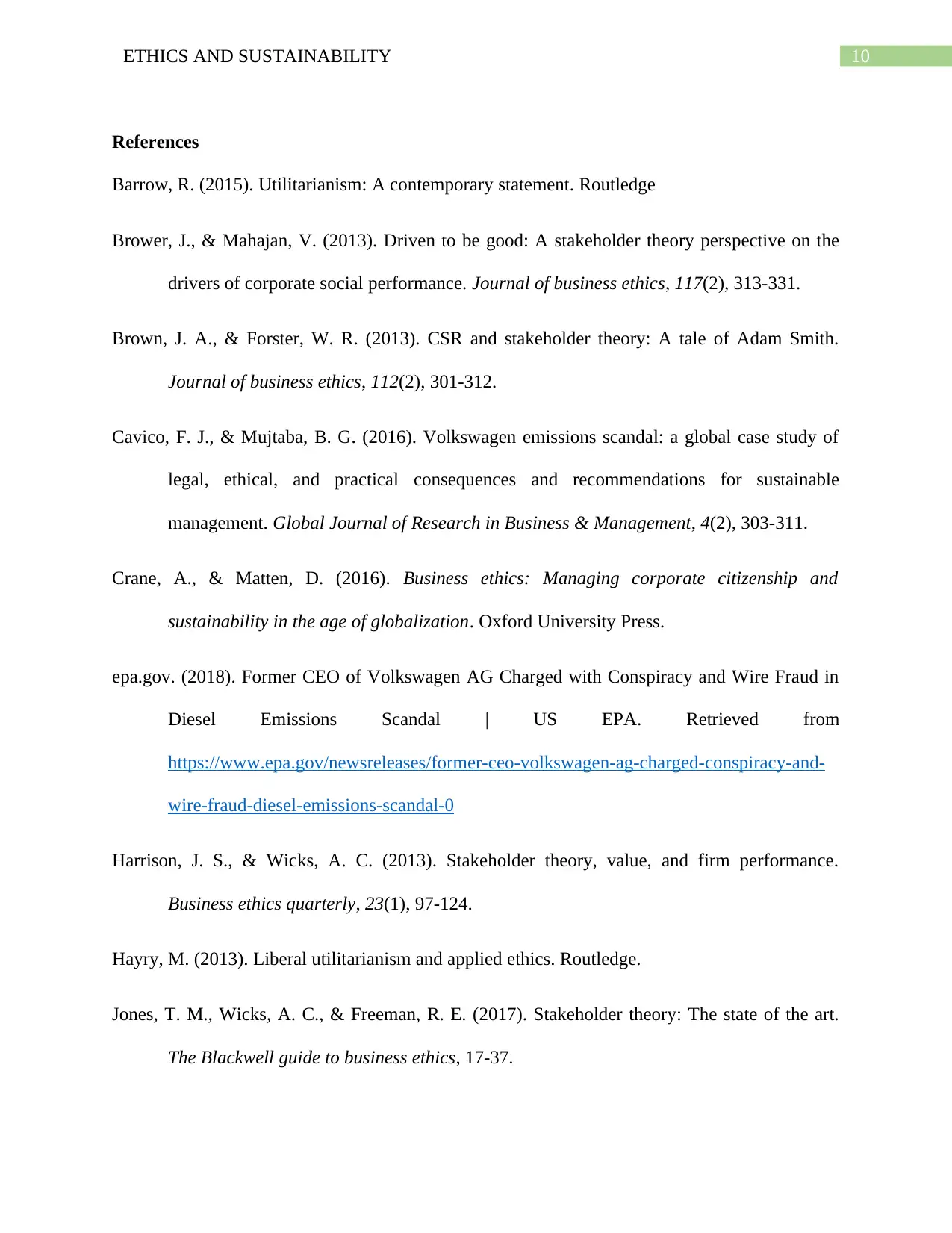
10ETHICS AND SUSTAINABILITY
References
Barrow, R. (2015). Utilitarianism: A contemporary statement. Routledge
Brower, J., & Mahajan, V. (2013). Driven to be good: A stakeholder theory perspective on the
drivers of corporate social performance. Journal of business ethics, 117(2), 313-331.
Brown, J. A., & Forster, W. R. (2013). CSR and stakeholder theory: A tale of Adam Smith.
Journal of business ethics, 112(2), 301-312.
Cavico, F. J., & Mujtaba, B. G. (2016). Volkswagen emissions scandal: a global case study of
legal, ethical, and practical consequences and recommendations for sustainable
management. Global Journal of Research in Business & Management, 4(2), 303-311.
Crane, A., & Matten, D. (2016). Business ethics: Managing corporate citizenship and
sustainability in the age of globalization. Oxford University Press.
epa.gov. (2018). Former CEO of Volkswagen AG Charged with Conspiracy and Wire Fraud in
Diesel Emissions Scandal | US EPA. Retrieved from
https://www.epa.gov/newsreleases/former-ceo-volkswagen-ag-charged-conspiracy-and-
wire-fraud-diesel-emissions-scandal-0
Harrison, J. S., & Wicks, A. C. (2013). Stakeholder theory, value, and firm performance.
Business ethics quarterly, 23(1), 97-124.
Hayry, M. (2013). Liberal utilitarianism and applied ethics. Routledge.
Jones, T. M., Wicks, A. C., & Freeman, R. E. (2017). Stakeholder theory: The state of the art.
The Blackwell guide to business ethics, 17-37.
References
Barrow, R. (2015). Utilitarianism: A contemporary statement. Routledge
Brower, J., & Mahajan, V. (2013). Driven to be good: A stakeholder theory perspective on the
drivers of corporate social performance. Journal of business ethics, 117(2), 313-331.
Brown, J. A., & Forster, W. R. (2013). CSR and stakeholder theory: A tale of Adam Smith.
Journal of business ethics, 112(2), 301-312.
Cavico, F. J., & Mujtaba, B. G. (2016). Volkswagen emissions scandal: a global case study of
legal, ethical, and practical consequences and recommendations for sustainable
management. Global Journal of Research in Business & Management, 4(2), 303-311.
Crane, A., & Matten, D. (2016). Business ethics: Managing corporate citizenship and
sustainability in the age of globalization. Oxford University Press.
epa.gov. (2018). Former CEO of Volkswagen AG Charged with Conspiracy and Wire Fraud in
Diesel Emissions Scandal | US EPA. Retrieved from
https://www.epa.gov/newsreleases/former-ceo-volkswagen-ag-charged-conspiracy-and-
wire-fraud-diesel-emissions-scandal-0
Harrison, J. S., & Wicks, A. C. (2013). Stakeholder theory, value, and firm performance.
Business ethics quarterly, 23(1), 97-124.
Hayry, M. (2013). Liberal utilitarianism and applied ethics. Routledge.
Jones, T. M., Wicks, A. C., & Freeman, R. E. (2017). Stakeholder theory: The state of the art.
The Blackwell guide to business ethics, 17-37.
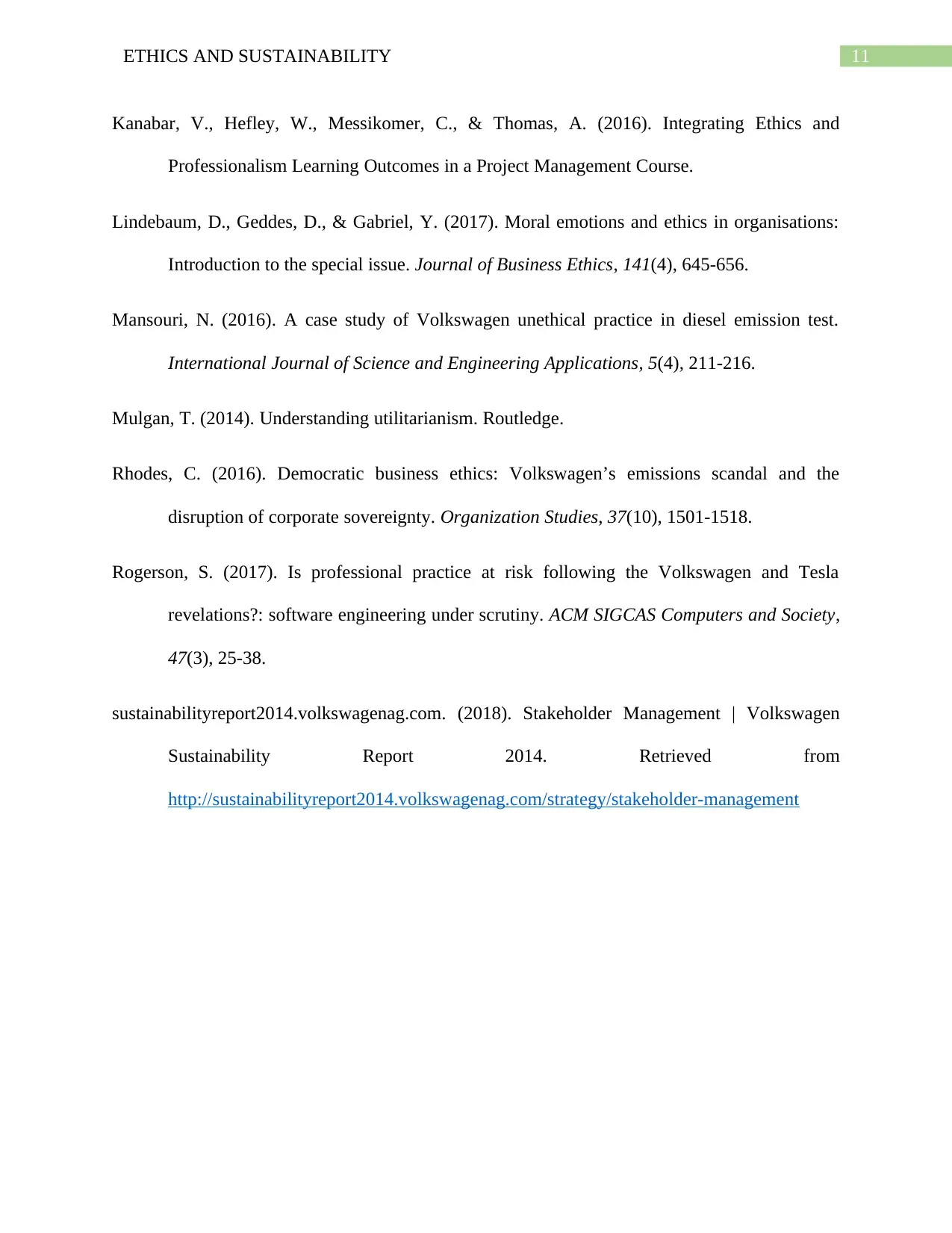
11ETHICS AND SUSTAINABILITY
Kanabar, V., Hefley, W., Messikomer, C., & Thomas, A. (2016). Integrating Ethics and
Professionalism Learning Outcomes in a Project Management Course.
Lindebaum, D., Geddes, D., & Gabriel, Y. (2017). Moral emotions and ethics in organisations:
Introduction to the special issue. Journal of Business Ethics, 141(4), 645-656.
Mansouri, N. (2016). A case study of Volkswagen unethical practice in diesel emission test.
International Journal of Science and Engineering Applications, 5(4), 211-216.
Mulgan, T. (2014). Understanding utilitarianism. Routledge.
Rhodes, C. (2016). Democratic business ethics: Volkswagen’s emissions scandal and the
disruption of corporate sovereignty. Organization Studies, 37(10), 1501-1518.
Rogerson, S. (2017). Is professional practice at risk following the Volkswagen and Tesla
revelations?: software engineering under scrutiny. ACM SIGCAS Computers and Society,
47(3), 25-38.
sustainabilityreport2014.volkswagenag.com. (2018). Stakeholder Management | Volkswagen
Sustainability Report 2014. Retrieved from
http://sustainabilityreport2014.volkswagenag.com/strategy/stakeholder-management
Kanabar, V., Hefley, W., Messikomer, C., & Thomas, A. (2016). Integrating Ethics and
Professionalism Learning Outcomes in a Project Management Course.
Lindebaum, D., Geddes, D., & Gabriel, Y. (2017). Moral emotions and ethics in organisations:
Introduction to the special issue. Journal of Business Ethics, 141(4), 645-656.
Mansouri, N. (2016). A case study of Volkswagen unethical practice in diesel emission test.
International Journal of Science and Engineering Applications, 5(4), 211-216.
Mulgan, T. (2014). Understanding utilitarianism. Routledge.
Rhodes, C. (2016). Democratic business ethics: Volkswagen’s emissions scandal and the
disruption of corporate sovereignty. Organization Studies, 37(10), 1501-1518.
Rogerson, S. (2017). Is professional practice at risk following the Volkswagen and Tesla
revelations?: software engineering under scrutiny. ACM SIGCAS Computers and Society,
47(3), 25-38.
sustainabilityreport2014.volkswagenag.com. (2018). Stakeholder Management | Volkswagen
Sustainability Report 2014. Retrieved from
http://sustainabilityreport2014.volkswagenag.com/strategy/stakeholder-management
⊘ This is a preview!⊘
Do you want full access?
Subscribe today to unlock all pages.

Trusted by 1+ million students worldwide
1 out of 12
Related Documents
Your All-in-One AI-Powered Toolkit for Academic Success.
+13062052269
info@desklib.com
Available 24*7 on WhatsApp / Email
![[object Object]](/_next/static/media/star-bottom.7253800d.svg)
Unlock your academic potential
Copyright © 2020–2026 A2Z Services. All Rights Reserved. Developed and managed by ZUCOL.




